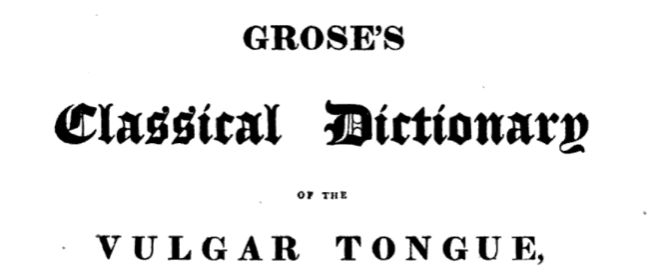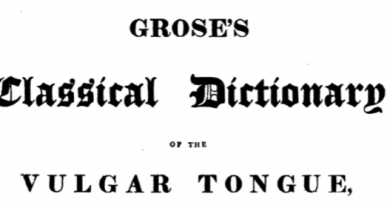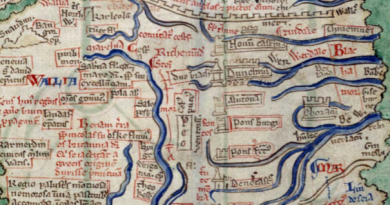Dictionary of the Vulgar Tongue – Day 287, 288 and 289
The Dictionary of the Vulgar Tongue was first published at the end of the eighteenth century, and given that the current health crisis is giving too much time to read books, I thought I’d pick a daily word from it until I got bored…. And to catch up after getting behind with these posts, and because I’m getting towards the end of the book, I’m doing three days at once now. How lovely….
Reverence
I feel that I can add nearly nothing to this definition from Grose:
“An ancient custom, which obliges any person easing himself near the highway or footpath, on the word Reverence being given him by a passenger, to take off his hat with his teeth, and without moving from his station to throw it over his head, by which it frequently falls into the excrement; this was considered as a punishment for the breach of delicacy. A person refusing to obey this law, might be pushed backwards. Hence, perhaps, the term Sir-Reverence.”
The ‘Sir-Reverence’ lingered on in the English language, meant as an apology in advance for what someone was about to do or say. That’s all that needs writing here….
Rhino
Nice and simple definition this time, especially given Grose’s meanderings with the above, simply meaning “money” and it was used by the canting, or criminal, fraternity. This word has been used since the early sixteenth century as a slang for money and no-one is quite sure where it originated from. It might be that rhino horn was expensive, it might be that rhino was seen as an bulky and expensive thing (and the rhino would have been a relatively new concept for westerners at the time) or it could be from the Greek meaning of the word rhinoceros, which is “relating to the nose” as someone paying through the nose (another old phrase). And Green’s Dictionary of Slang adds another possibility to the mix, which is “clipping of SE sovereign; the term moved f. Und. to general slang, in mid-19th century”. So, in short, no-one knows, and this meaning of the word became archaic in around the late nineteenth century.
Riff Raff
I use this phrase from time to time (I won’t name the friends I have in mind), defined by Grose as “low vulgar persons, mob, tag-rag and bob-tail” and it hasn’t much changed its meaning since the dictionary was published in the late eighteenth century. The phrase is from the late fifteenth century, it’s a corruption of the old French “rif et raf” meaning “one and all”, so there’s some heritage to this.
Although there’s a long history to this phrase, it’s only recently that it has become more commonly used. I suspect that some of this is related to the Rocky Horror (Picture) Show from the 1970s onwards, where Riff Raff is one of the characters.




